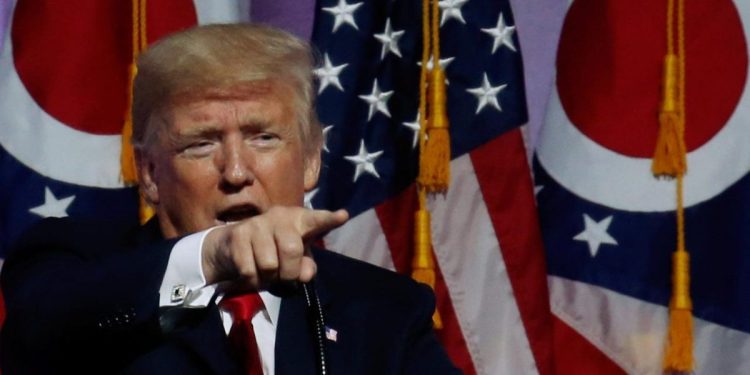As a general statement, debate is a critically important element of the democratic political process, particularly when it helps reveal objective truths, points of consensus, and potential areas of improvement. Civics classes teach Americans to welcome more voices and perspectives, and, prior to the rise of trolls and disinformation campaigns, the value of an open debate before reaching any important decision was fundamental to each branch of the United States government.
To the Trump administration’s credit, there are indeed active internal debates within the executive branch as to how to safely move forward with 5G networks, arguably the most important communications technology of the coming decade. For years, the U.S. government has been publicly wrestling with 5G security inside and outside its borders, openly barring Chinese 5G hardware makers such as Huawei from supplying 5G networking gear, and pushing foreign allies to avoid or substantially restrict the same products. Various members of the administration have weighed in on alternatives, the White House has convened 5G summits and related gatherings, and — surprisingly — key people involved in the decision-making process have abruptly quit.
Two years into the process, there still aren’t any big plans or answers. Back in January 2018, the administration floated and then downplayed the prospect of launching a nationalized 5G network, all in the name of protecting data from Chinese surveillance or control. Though that discussion continued to simmer on the back burner for months, the White House suggested in late 2018 it had decided instead to “prioritize efforts to accelerate the private sector’s development of 5G.”
There wasn’t much movement on 5G security over the last year, either. Members of the House of Representatives sought an official U.S. role in future cellular standards development, eventually approving a bill that has yet to be voted on by the Senate, and has only an estimated 3% chance of passage. At the same time, 5G security remained a moving target, and despite attempts by the U.S. government to come up with workable compromises on international 5G security, even close allies have rejected its concerns after extensive deliberations, opting to let Huawei supply some of their network gear.
June 5th: The AI Audit in NYC
Join us next week in NYC to engage with top executive leaders, delving into strategies for auditing AI models to ensure fairness, optimal performance, and ethical compliance across diverse organizations. Secure your attendance for this exclusive invite-only event.
Meanwhile, all of the top U.S. cellular providers have already launched 5G networks — without Huawei gear, but also without completely finalized 5G security measures — so there are questions as to what can actually be done at this point to make the U.S. 5G network more secure. Practically speaking, carriers are all but certainly going to upgrade their existing hardware with more secure software, and add the latest, most hardened 5G hardware to the cores and edges of their networks.
The Trump administration is still debating what to do over security. This week, the Wall Street Journal reported that White House economic adviser Larry Kudlow is hoping to get Microsoft and Dell involved in producing a fully American 5G network infrastructure, likely a spiritual successor to President Trump’s November 2019 attempt to get Apple involved in a similar plan. Today, Axios reported that Attorney General William Barr publicly dismissed that effort, calling the idea “pie in the sky” and saying it “would not be ready for prime time for a decade, if ever.”
Normally, one might wonder why an attorney general would weigh in on telecommunications policy — and why anyone would listen — but Barr’s prior work as a Verizon executive vice president and top in-house lawyer means he’s at least speaking from experience. He’s also more likely to be correct: There’s virtually no chance that yet-to-be-developed Microsoft software and Dell hardware would be a reliable alternative anytime soon to trusted, already available Ericsson, Nokia, and Samsung 5G networking gear.
Barr suggested an alternative that makes some sense: Spend U.S. dollars to fund a European provider such as Ericsson or Nokia, enabling it to gain the scale of a Chinese government-aided Huawei or South Korea-backed Samsung. “Putting our large market and financial muscle behind one or both of these firms would make it a far more formidable competitor and eliminate concerns over its staying power,” Barr claimed. “We and our closest allies certainly need to be actively considering this approach.”
Regardless of whether Barr’s plan is ideal, it has the benefit of moving the 5G security discussion forward. In comments reported by Bloomberg, Barr said that it was “imperative” that decisions on this topic be made “right away,” as a “market-ready alternative” to Huawei’s technology is needed today — not years from now.
Under the Trump administration, the U.S. hasn’t had a great track record of healthy or particularly well-informed political debates, but in this case, it’s time for the public infighting and fantasies over new U.S. alternatives to European and Asian 5G gear to end. At this point, with 5G networks actively coming online across the world, complete or substantial inaction on the topic of network security is no longer an option, and it’s time to put a realistic plan in place to guarantee that the cellular infrastructure connecting phones, computers, automobiles, hospitals, and cities is as safe as possible for all its users.


